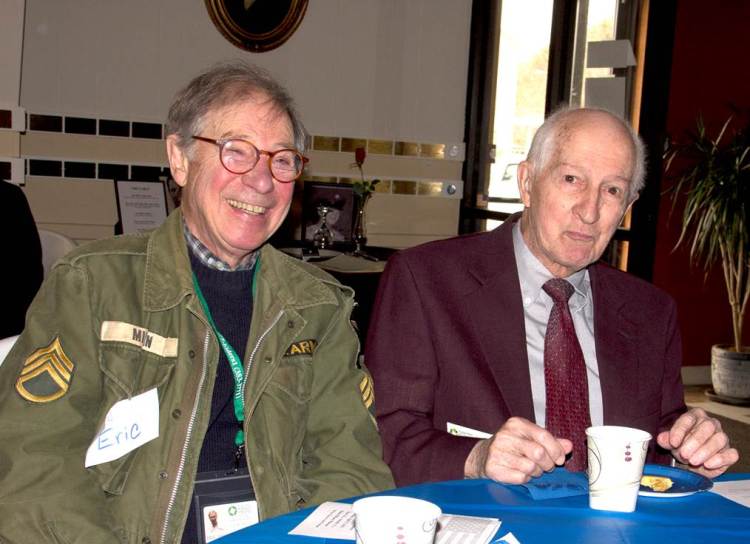When Vernon Huestis and Eric Mihan first met in 2014, it was a bit like a blind date. They had been put together by a fledgling nonprofit organization that foresaw value in matching military veterans for twice-monthly visits.
Mihan was one of the initial volunteers in the Vet to Vet Maine program, offering to meet regularly with another veteran who, because of circumstances or health, had become isolated. Huestis was basically housebound because he was caring for his wife in their Biddeford home. He, too, saw the value of companionship and signed up to receive the potential benefits being offered by the organization.
It wasn’t long before the pair were meeting a couple of times a week.
“It turned out we were in the same outfit,” Huestis said. “That gave us something to talk about, and we found out that we had like interests.”
Over six years and more than 300 face-to-face visits later, Huestis, now 93, and Mihan, 82, turned an acquaintance initially based on shared military service into a true friendship, bound by their love of books, similarities in their personal history and mostly time spent together, in both good times and tough moments.
Then the coronavirus pandemic hit.
Huestis now lives at Evergreen Rehabilitation & Living Center, an elder care facility in Saco, where he and his wife, Theresa, moved prior to her death in February 2019. Evergreen, like nearly all nursing homes across the country, has not allowed in-person visitors since the pandemic hit Maine.
“In six years, it’s become a real part of my, our, relationship,” Mihan said. “Because we simply can’t do it, well, it’s like kids not getting to see their schoolmates.”
Mihan has kept in contact, calling three times a week, but for many months was not allowed to bring a fresh supply of new books to provide spark to their conversations.
“I honestly can’t imagine his life without Eric,” said Martha Huestis, Vernon’s daughter. “It may be the best thing that’s happened to him. It’s been instrumental to him.”
That type of impact is exactly what Susan Dudley Gold had in mind when she developed Vet to Vet Maine in 2014. The program was originally under the auspices of the Southern Maine Agency on Aging. It became an independent nonprofit in 2018 and is still under the leadership of Dudley Gold, the executive director.
“They’re fabulous, both of them, and I love their relationship. It’s exactly what we strive for in this organization,” Dudley Gold said.
“They marked their 300th visit earlier in the year, and there’s no one in my life that I see that often other than my husband,” Dudley Gold said. “You figure out how much time that is; how many people do you, or any of us, see that frequently?”
Vet to Vet Maine currently supports between 70 to 80 volunteer veterans who connect with other veterans in York and Cumberland counties.
Huestis and Mihan were one of the original pairings. They were matched for specific reasons, Dudley Gold said. They lived near each other; Mihan lives in Kennebunk. Both served in the U.S. Army 2nd Infantry Division. Huestis, drafted when he was 18, served from 1945-46, entering at the tail end of World War II and spending most of his service time at Fort Lewis in Tacoma, Washington, leaving with a rank of private first class. Mihan, also a draftee, spent most of his active duty (November 1961 to November 1963) at Fort Benning in Georgia. After two years of active reserve duty, he earned the rank of staff sergeant.
Both men said that, after the initial meetings, their talks seldom focused on their military service.
The mutual love of reading quickly became apparent. Historical novels and biographies are popular genres. Huestis still reads up to 600 pages a week.

Former Army Staff Sgt. Eric Mihan in his Kennebunk home. Mihan, a Vet to Vet Maine volunteer, has visited WWII veteran Vernon Huestis more than 300 times since first being matched up in the program in 2014. Ben McCanna/Staff Photographer
“I think getting books to him and keeping his mind active is the best thing I can do for him, about the only thing I can do for him now,” Mihan said.
Gradually they found other connections. For instance, both had worked in a family business started by their fathers – Huestis in a machine shop in Bristol, Rhode Island, and Mihan in a retail clothing store in Princeton, New Jersey.
“Being SOBs – sons of bosses – we did experience some similar things that were either joys or frustrations,” Mihan said.
“There’s some truth to that,” Huestis agreed with a light chuckle.

Vernon Huestis, left, and Vet to Vet Maine volunteer Eric Mihan share a love of books and were also in the same infantry division, though nearly 20 years apart. Photo courtesy of Martha Huestis
Both men said they miss their regular visits.
“Absolutely, and I don’t know when it’s going to start again,” Mihan said, “especially with care facilities. That’s where the problems are, and it’s a much more vulnerable population.”
For Huestis, the coronavirus has heightened the isolation felt by so many in nursing homes.
“I think I’m the only one from World War II left in this building,” he said. “The rest have died.”
Both men are looking forward to the day they can resume their face-to-face meetings.
“You get more out of it than you put into it,” Mihan said. “It’s the knowledge that you’re providing a little company, a little conversation, a break from routine.”
Comments are not available on this story.
Send questions/comments to the editors.



